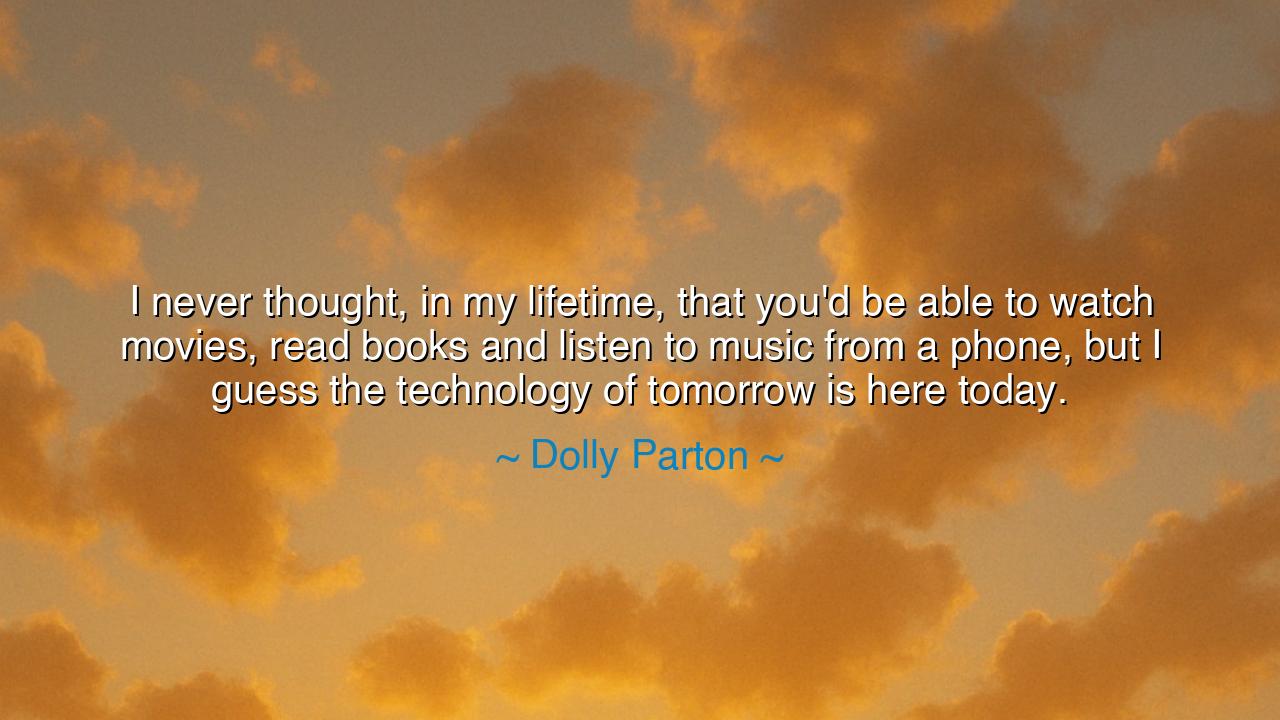
I never thought, in my lifetime, that you'd be able to watch
I never thought, in my lifetime, that you'd be able to watch movies, read books and listen to music from a phone, but I guess the technology of tomorrow is here today.






Listen, O seekers of wisdom, to the words of Dolly Parton, a voice that carries the echoes of change and progress: “I never thought, in my lifetime, that you’d be able to watch movies, read books, and listen to music from a phone, but I guess the technology of tomorrow is here today.” These words, spoken with wonder and awe, reflect a profound truth—that the march of time and technology has brought us to a moment when the impossible becomes not just possible, but commonplace. In Parton’s reflection, there is a recognition of how swiftly the world around us is changing, how quickly we adapt, and how the tools of the present continue to shape the future.
In the days of the ancients, the Greeks and Romans marveled at their own technological advancements. The water clock and the Archimedean screw were wonders that reshaped how people lived, worked, and understood the world. Yet, even those who invented such marvels could not have imagined the speed at which their inventions would be surpassed. Dolly Parton’s words speak to the same amazement that Plato must have felt when he saw the first writing tablets or when Alexander the Great witnessed the immense capabilities of his army’s technology in battle. Progress is inevitable, and it is through the lens of the present moment that we come to see the impossible become reality.
Consider the Renaissance, that period of immense discovery when minds like Leonardo da Vinci and Michelangelo were given the tools to shape the world. They could never have foreseen the rise of modern technology, but their work was itself a product of a world ever changing. Parton’s observation is a continuation of this human tradition: every era gives rise to its own technological wonders, but it is the adaptation of those wonders that brings about the greatest change. Just as the printing press revolutionized the spread of ideas in the 15th century, so too does the smartphone revolutionize how we experience culture today.
Think of the tale of Gutenberg, who, in the 15th century, created the printing press, an invention that was nothing short of revolutionary. In that time, to read a book was a rare privilege, accessible only to the few. Yet with the advent of the printing press, books became available to the masses, and the very spread of knowledge was forever altered. Gutenberg could never have foreseen that in the centuries to come, books, music, and even films would fit into the palm of our hands. Parton’s words echo the same sense of awe and wonder at the evolution of the tools that we use to communicate, to share ideas, and to entertain. Just as the printing press was the hallmark of its age, so too is the smartphone the beacon of today’s technological revolution.
Parton’s reflection carries with it not only a sense of awe but a lesson in the impermanence of what we know. The world that once seemed static, the one where books were read in libraries, music played on vinyl, and movies shown in theaters, is changing rapidly. Yet, this change is not something to fear. It is the natural course of human innovation. To resist this progress is to resist the very force that propels humanity forward. Each technological advancement, whether it was the discovery of fire or the advent of the internet, has brought new possibilities for expression and communication.
Now, O seekers, the lesson in Parton’s words is clear. We stand at a moment in history where the tools of creation and expression are not limited by space or time. We can create, share, and experience in ways our ancestors could not have imagined. The smartphone is more than just a device—it is a portal to an entirely new realm of possibilities, a reflection of the immense progress humanity has made. Yet, in our awe of this new world, we must not forget that the essence of creation, the soul of music, art, and storytelling, remains timeless. The tools may change, but the human desire to create and to share that creation with others is eternal.
Therefore, O future generations, take heed of the wisdom in Parton’s reflection. Do not be daunted by the speed of technological progress, nor overwhelmed by the multitude of ways in which you can now engage with the world. Instead, embrace the tools at your disposal, for they are the legacy of those who have come before you, and the gateway to your own creativity. Whether in the pages of a book, the notes of a song, or the frames of a film, use the technology of today to shape the future, as those before you did with the tools of their time. And in this ever-changing world, remember that it is not the tools that define us, but how we use them to express our humanity.






AAdministratorAdministrator
Welcome, honored guests. Please leave a comment, we will respond soon